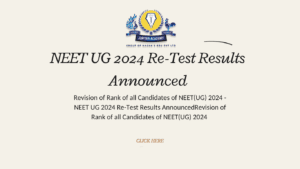NEET UG 2024 Re-Test result NTA Had Conducted the Re-test...
Read MoreNEET MCQS S BLOCK ELEMENT

The following s-block elements are important in the NEET exam:
Thank you for reading this post, don't forget to subscribe!Group 1 (Alkali metals)
- Lithium (Li)
- Sodium (Na)
- Potassium (K)
Group 2 (Alkaline earth metals)
- Magnesium (Mg)
- Calcium (Ca)
These elements are important because they have a wide range of applications in industry and biology. For example, sodium and potassium are essential electrolytes that play a vital role in many physiological processes, such as nerve conduction and muscle contraction. Magnesium is a cofactor for many enzymes, and calcium is important for bone formation and muscle function.
The following topics related to s-block elements are important for the NEET exam:
- Electronic configuration and general physical and chemical properties of s-block elements
- Anomalous properties of the first member of each group
- Diagonal relationship between lithium and magnesium
- Preparation and properties of important compounds of s-block elements, such as sodium chloride (NaCl), sodium hydroxide (NaOH), sodium carbonate (Na2CO3), sodium bicarbonate (NaHCO3), calcium oxide (CaO), calcium hydroxide (Ca(OH)2), and calcium carbonate (CaCO3)
- Biological importance of sodium, potassium, magnesium, and calcium
Here are some multiple-choice questions (MCQs) related to S-block elements, which include elements from Group 1 (alkali metals) and Group 2 (alkaline earth metals) of the periodic table. These questions are suitable for practice in preparation for the NEET (National Eligibility cum Entrance Test) or any other relevant exams.
1. Which element belongs to Group 1 of the periodic table?
a) Calcium (Ca)
b) Sodium (Na)
c) Magnesium (Mg)
d) Chlorine (Cl)
2. Alkali metals are known for their:
a) High electronegativity
b) Low reactivity with water
c) Low melting points
d) High density
3. Which alkali metal is the most abundant in the Earth’s crust?
a) Lithium (Li)
b) Sodium (Na)
c) Potassium (K)
d) Rubidium (Rb)
4. Which alkaline earth metal is used as a radiographic contrast agent in medical imaging?
a) Beryllium (Be)
b) Magnesium (Mg)
c) Calcium (Ca)
d) Barium (Ba)
5. When alkali metals react with water, they produce:
a) Hydrogen gas and a metal oxide
b) Oxygen gas and a metal hydroxide
c) Hydrogen gas and a metal hydroxide
d) Oxygen gas and a metal oxide
6. Which alkaline earth metal is commonly found in bones and teeth?
a) Calcium (Ca)
b) Magnesium (Mg)
c) Strontium (Sr)
d) Barium (Ba)
7. Which of the following alkali metals is the most chemically reactive?
a) Lithium (Li)
b) Sodium (Na)
c) Potassium (K)
d) Rubidium (Rb)
8. The alkali metal that is used in nuclear reactors as a coolant is:
a) Lithium (Li)
b) Sodium (Na)
c) Potassium (K)
d) Cesium (Cs)
Answers:
1. b) Sodium (Na)
2. c) Low melting points
3. b) Sodium (Na)
4. d) Barium (Ba)
5. c) Hydrogen gas and a metal hydroxide
6. a) Calcium (Ca)
7. c) Potassium (K)
8. a) Lithium (Li)
These questions should help you review the basics of S-block elements. Remember to study the properties and reactions of alkali metals and alkaline earth metals in detail for your exam preparation.
JEE MCQS S BLOCK ELEMENT
Here are some multiple-choice questions (MCQs) related to the s-block elements, which are commonly encountered in the Joint Entrance Examination (JEE) for admissions to various engineering colleges in India. These questions cover various aspects of s-block elements:
1. Which element belongs to Group 2 of the periodic table?
a) Sodium (Na)
b) Calcium (Ca)
c) Chlorine (Cl)
d) Oxygen (O)
2. The alkaline earth metals belong to which group in the periodic table?
a) Group 1
b) Group 2
c) Group 17
d) Group 18
3. Which of the following elements is the most reactive among the alkaline earth metals?
a) Beryllium (Be)
b) Magnesium (Mg)
c) Calcium (Ca)
d) Barium (Ba)
4. Which s-block element is known for its high reactivity with water, resulting in the evolution of hydrogen gas?
a) Lithium (Li)
b) Sodium (Na)
c) Potassium (K)
d) Rubidium (Rb)
5. Alkaline earth metals have _____ valence electrons.
a) 1
b) 2
c) 6
d) 7
6. Which alkaline earth metal forms a stable nitrate with the formula Ba(NO3)2?
a) Beryllium (Be)
b) Magnesium (Mg)
c) Calcium (Ca)
d) Barium (Ba)
7. Which of the following s-block elements is used in the manufacture of fireworks due to its characteristic red flame color?
a) Lithium (Li)
b) Sodium (Na)
c) Potassium (K)
d) Rubidium (Rb)
8. What is the general electronic configuration of the alkali metals in Group 1 of the periodic table?
a) ns^1
b) ns^2
c) ns^2 np^1
d) ns^2 np^2
Answers:
1. b) Calcium (Ca)
2. b) Group 2
3. d) Barium (Ba)
4. c) Potassium (K)
5. b) 2
6. d) Barium (Ba)
7. c) Potassium (K)
8. a) ns^1
These questions cover some fundamental concepts related to the s-block elements. Please note that the actual JEE questions may vary in format and difficulty, so it’s essential to thoroughly study the topic to perform well in the exam.
JEE Advanced 2024 registration window opens at jeeadv.ac.in. Here is how to apply
JEE Advanced 2024 registration window opens The Indian Institute of...
Read MoreLast chance for Photo correction in NEET 2024 Forms
Last Chance for Photo Correction in NEET 2024 Forms! Don’t...
Read MoreNEET UG 2024 exam city slips out now
Registered candidates can download their city slips from the official...
Read MoreNEET MCQS S BLOCK ELEMENT NEET MCQS S BLOCK ELEMENT NEET MCQS S BLOCK ELEMENT NEET MCQS S BLOCK ELEMENT NEET MCQS S BLOCK ELEMENT NEET MCQS S BLOCK ELEMENT NEET MCQS S BLOCK ELEMENT NEET MCQS S BLOCK ELEMENT NEET MCQS S BLOCK ELEMENT NEET MCQS S BLOCK ELEMENT NEET MCQS S BLOCK ELEMENT NEET MCQS S BLOCK ELEMENT
JEE MCQS ON S BLOCK ELEMENT JEE MCQS ON S BLOCK ELEMENT JEE MCQS ON S BLOCK ELEMENT JEE MCQS ON S BLOCK ELEMENT JEE MCQS ON S BLOCK ELEMENT JEE MCQS ON S BLOCK ELEMENT JEE MCQS ON S BLOCK ELEMENT JEE MCQS ON S BLOCK ELEMENT JEE MCQS ON S BLOCK ELEMENT JEE MCQS ON S BLOCK ELEMENT






